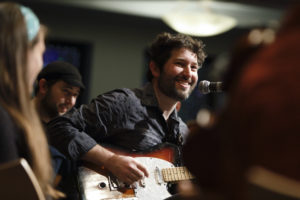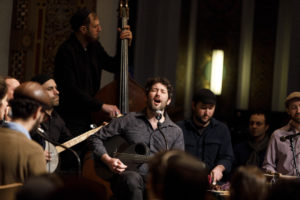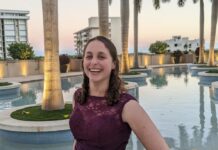
There’s a lot of similarities between blues music and Jewish music, at least according to Joey Weisenberg.
They both have limited scales and notes used in songs, making them prime genres for variations and improvisations. They both “speak from the heart.”
“Blues and nigunim (Jewish wordless melody) share a sense of longing, and a sense of depth and connection to the emotion of being alive,” Weisenberg said.
For Weisenberg, tapping into that depth is what drives his creation of music. He’s the founder and director of the Rising Song Institute, a Philadelphia-based community of musicians and prayer leaders in pursuit of innovative reimaginings of traditional Jewish music as a spiritual practice.
On May 26, Weisenberg, 40, performed his February 2022 album “L’eila” at the Weitzman National Museum of American Jewish History, his first time performing songs from the album with a band and live audience.
But for someone who’s spent the last decade building community through the Rising Song Institute, an offshoot of the Hadar Institute, a New York-based egalitarian yeshiva, and its predecessor, the Hadar Center for Communal Jewish Music, Weisenberg’s experience creating his most recent project was marked by solitude.
“In COVID, there was no chance to sing with big groups of people, and so this project took on a little bit more of a quality of introspection and of solitude and self reflection, and it’s a bit more meditative, and it’s also a bit more sad,” Weisenberg said.
Weisenberg’s past seven projects have been a collection of nigunim, intended to create sing-a-long experiences in live performances. On “L’eila,” Weisenberg puts music to psalms, wailing words of Hebrew in the Ashkenazes dialect, accompanied in many songs by only a guitar.
Weisenberg, a Mount Airy resident, recorded the album last summer but composed it in his weekly online open studio sessions, a virtual audience a balm for pandemic-induced isolation.
“It was really encouraging to be able to compose in real time,” he said.
Balancing an album produced in solitude with playing it for his community coincided with the themes about which Weisenberg sang. Many psalms have themes of balancing mourning and joy.
“There’s a line [in “Odekha (Psalm 118)”] that says, ‘This is the greatest day that was ever created! Let’s be happy and joyous!’ And then literally the next sentence within the same breath, you say, ‘God save us now!’” Weisenberg said. “You get this roller coaster ride of emotion and feeling in every song, and it just goes up and down. And that’s kind of what life is like these days.”

Embracing opposites and conflicting ideas is at the core of Jewish thought, Weisenberg said. It’s also at the core of his own musical genesis.
Growing up in Milwaukee, Wisconsin to a musical family, Weisenberg spent some of his evenings at a blues bar on one side of town, playing electric guitar semi-professionally; on the other nights, he would join his grandfather and a community of Twerski Hasidim on the other side of town for rousing nigunim.
After taking a pre-med track at Columbia University, Weisenberg decided against attending medical school and instead became a session musician by age 22, acting as a musical chameleon and playing various instruments to help out bands recording albums.
Fifteen years of “musical tourism” left Weisenberg wanting to see what kind of music he could produce after being filled with music from different genres and bands from all over the world.
On the brink of creative overflow, Weisenberg attended a Hadar retreat over Shavuot one year. He took a 5 a.m. shift, playing music for sleepy students studying Torah to keep them awake and to keep morale high.
“I would just start making up nigunim, almost like they were being revealed like at Mount Sinai,” he said.
Weisenberg attributes the beginning of his songwriting to his young family. When his first of four children was born, Weisenberg’s infant would not stop crying. Weisenberg would sing nigunim to his baby, sometimes all night long.
“I wrote hundreds of nigunim that year,” he said.
Even after over a decade of creating melodies, Weisenberg still describes himself as having music always running through his head.
“For better or worse,” Weisenberg said, “these years, I cannot stop the river of song that’s flowing out of me.”






